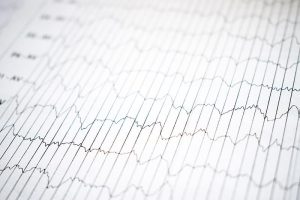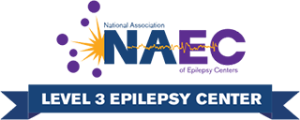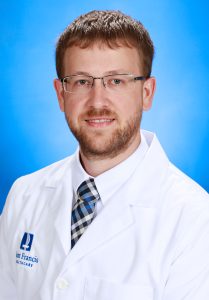The Saint Francis Healthcare System Epilepsy Center is comprised of a board-certified epileptologist, an inpatient Epilepsy Monitoring Unit, outpatient clinic, inpatient/outpatient neurophysiology, neuropsychologists and advanced imaging capabilities that all come together to provide advanced seizure and epilepsy care.
What is Epilepsy?
Epilepsy is a disease in which a person’s brain has the tendency to have seizures. A seizure is a surge of abnormal and increased brain electrical activity. Seizures can manifest in a variety of symptoms such as, but not limited to, staring or shaking of a limb up to full body shaking with complete loss of awareness and disruption of function. Epilepsy effects approximately one percent of the population.
Diagnosis
The diagnosis of epilepsy is predominantly made by a detailed taking of history. In fact, around 50 percent of patients can have a specific epilepsy diagnosis made just with history. Epilepsy is defined as having had two or more unprovoked seizures in a person’s lifetime. A diagnosis of epilepsy can also be made in a person with one unprovoked seizure and at least a 60 percent likelihood of having another seizure based on various testing, which includes electroencephalogram (EEG) and neuroimaging such at computerized tomography (CT), magnetic resonance imaging (MRI) and positron emission tomography (PET).
Treatments
Currently there are more than 25 antiseizure medications on the market. The majority of patients (about 65 percent) with epilepsy become seizure free with one-to-three antiseizure medications. Medical management should include proper drug selection based on side effects, interactions and the mechanism of the medication. Unfortunately, this still leaves approximately one-third of patients who are intractable or drug-resistant, who are identified after failing two antiseizure medications. For these patients, it is important to make a specific epilepsy diagnosis so the potential of epilepsy surgery can be considered. Epilepsy surgery represents the standard of care for epilepsy patients and provides the ability to make patients seizure free whom otherwise would continue to suffer. Epilepsy surgeries include safe removal of a small portion of brain (called lesionectomies or tailored lobectomies) as well as devices such as vagus nerve stimulators (VNS), deep brain stimulators (DBS) and responsive neurostimulators (RNS). Our Epilepsy Center works closely to tailor specific treatment options for each individual patient.
Epilepsy Care Team
Our epilepsy care team provides advanced seizure and epilepsy management and is able to readily identify and treat non-epilepsy seizure-like activities including non-epileptic attacks. The team is comprised of:
- Mark Farrenburg, MD, leads the team as the area’s only board-certified epileptologist, which is a neurologist with special training in epilepsy. He is a native of southeast Missouri and his priority is to improve epilepsy care in the region. He has extensive experience in both medical and surgical treatments of epilepsy, including the most complex of cases.
- Neuroradiologists able to identify subtle lesions that cause epilepsy on multiple imaging modalities.
- Neuropsychologists with experience in treating the psychosocial aspects of epilepsy as well the ability to perform neuropsychological testing to optimize cognitive function as well as epilepsy surgery evaluations.
- Inpatient nurses with special training in seizure management and the care of epilepsy patients.
- EEG technicians trained in both short as well as long-term EEG monitoring.
- Outpatient nurses and medical assistants with extensive experience in management of outpatient epilepsy care.
Why Choose the Saint Francis Epilepsy Center
As the area’s only specialized Epilepsy Center, Saint Francis brings the capabilities and services usually reserved only for larger cities, including:
- Epilepsy Monitoring Unit (EMU) – Specialized inpatient unit where patients undergo continuous video EEG monitoring in order to characterize seizures or seizure-like activity, quantify subclinical seizures or localize seizures for epilepsy surgery evaluation.
- ICU Continuous EEG Monitoring Capabilities
- Routine and Ambulatory EEG
- 3T epilepsy protocol MRI
- Neuropsychology services including presurgical evaluations for epilepsy surgery workup as well as treatment for patients with nonepileptic attacks
- Local epilepsy surgery evaluations – If a patient requires surgery, the Epilepsy Center develops a joint surgical plan with outside surgery centers and remains involved throughout the process.
The Saint Francis Epilepsy Center provides superior epilepsy care with the goal of seizure freedom, regardless of a patient’s epilepsy complexity.





